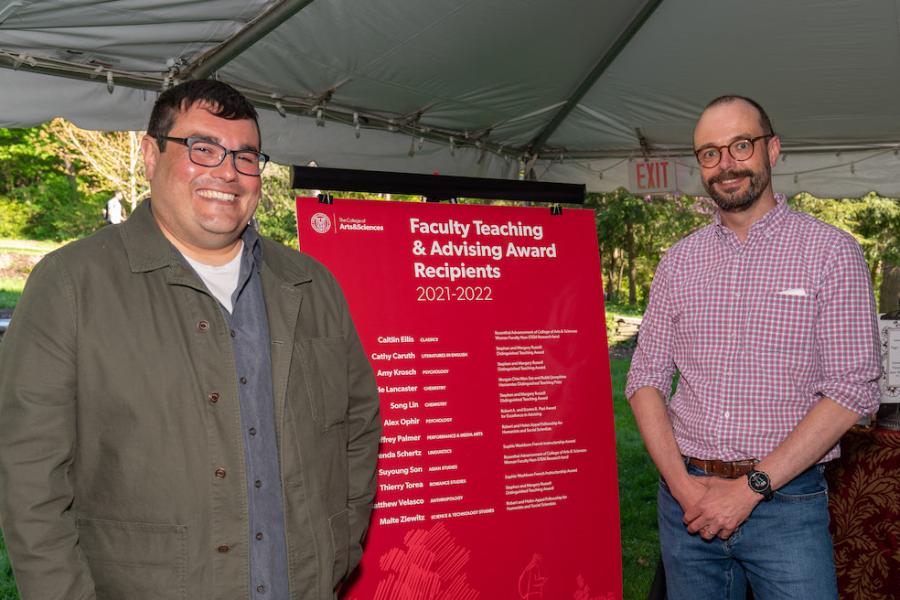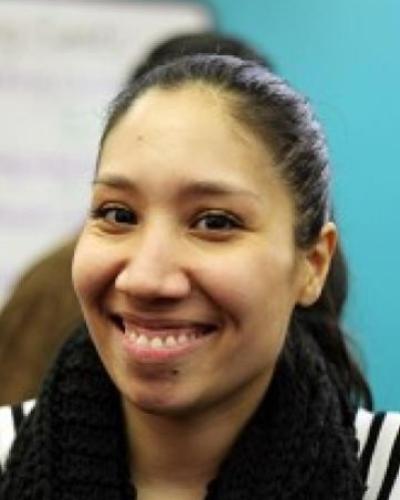At the end of each academic year, the College of Arts & Sciences recognizes excellence in teaching and advising. This year’s award winners include Jeffrey Palmer and Malte Ziewitz, recipients of the 2022 Robert and Helen Appel Fellowship for Humanists and Social Scientists; Alex Ophir, recipient of the 2022 Robert A. and Donna B. Paul Academic Advising Award; and Kyle Lancaster, recipient of the 2022 Morgan Chia-Wen Sze and Bobbi Josephine Hernandez Distinguished Teaching Prize.
These Arts and Sciences faculty members will be honored at a university-wide event May 27 recognizing excellence in teaching and advising.
“It is wonderful to celebrate these awardees, who exemplify the many remarkable teachers and advisors in the College of Arts and Sciences,” said Ray Jayawardhana, the Harold Tanner Dean of the College of Arts and Sciences. “These faculty members and graduate teaching assistants have made tremendous contributions for the benefit of our students, guiding their educational paths and molding their experiences. I am deeply grateful to Robert and Helen Appel, to Robert and Donna Paul, to Morgan Chia-Wen Sze and Bobbi Josephine Hernandez, and to the other generous donors who recognize and elevate the importance of teaching and advising for our students, our faculty, and our whole community.”
The Robert and Helen Appel Fellowship has recognized faculty excellence since 1995 and gives recipients a semester’s study leave at full salary to write, develop new courses, conduct research or otherwise enrich their teaching and scholarship.
Palmer, assistant professor of performing and media arts, is an Indigenous filmmaker and scholar whose work is focused on revealing untold stories of Native America with what one reviewer called a “transformational approach to filmmaking.” His 2019 film “N. Scott Momaday: Words from a Bear” premiered at the Sundance Film Festival and won many awards and received an Emmy nomination. He is currently directing a fiction film with Austin Bunn, associate professor of performing & media arts, that will be produced this summer entitled “Ghosts.” Palmer has collaborated with other Cornell scholars as well, such as in “Off Campus/On Screen: Cornell Life in Times of COVID-19,” a collection of student-centered stories. His commitment to supporting students who want to tell untold stories and his deep interest in student work have significantly boosted student interest in filmmaking; his innovative hands-on film courses were pedagogical triumphs during the remote semesters of 2020 and 2021.
Ziewitz, assistant professor of science and technology studies, researches digital governance, the rules and policies around digital technologies focusing on how people encounter and make sense of algorithmic systems. His academic work has real relevance to the way we live our lives; while many scholars focus on what algorithms do, Ziewitz pays attention to how people encounter and make sense of algorithmic systems within the frame of other forms of power, control, and reason. He looks at information technologies in order to understand and to help people; his teaching demonstrates similar caring. As one student wrote, Ziewitz’s “mind works in the realm of ideas and theory yet he is connected to the world and his students as a project leader, scholar, and eager and empathetic advisor to many.” Ziewitz’s “Due Process Clinic” was granted the first Cornell Quantitative and Interpretive Research Institute Innovation Award and demonstrates his commitment to outreach and social justice.
The Robert A. and Donna B. Paul Academic Advising Award was established in 1992 to honor undergraduate advisers who make a difference in the lives of their students. Recipients receive one-half an academic year’s salary and fringe benefits for a leave that is taken within the next three years.
In his research, Ophir, associate professor of psychology, seeks to understand the proximate control of social behavior and the ultimate consequences of these behaviors. His lab, known for integration of undergraduate and graduate researchers, examines the roles of specific brain regions in coordinating social recognition and diverse attributes of temperament related to attachment, aggression, and care-giving. His dedication to the welfare and success of his students, advisees and those who simply seek him out is impressive. He has an extraordinary record of publishing with undergraduates: 18 publications with undergraduate co-authors. One student, a varsity athlete, wrote that Ophir “helped feed my curiosity and love of research through his passion and his ability to both challenge his students and provide them with the support they need to succeed.” In addition to supporting individual students, Ophir serves on the psychology department’s Diversity, Inclusion and Equity Committee and as Director of Student Engagement.
The Morgan Chia-Wen Sze and Bobbi Josephine Hernandez Distinguished Teaching Prize, first awarded in 2018, honors faculty members for excellence in teaching. Honorees are encouraged to use a portion of the $25,000 award to travel anywhere in the world of interest to them and, through that travel, to “bring the world back to Cornell.”
The research of Lancaster, associate professor of chemistry and chemical biology, uses synthesis, biochemistry and spectroscopic methods to explore reactivity mediated by transition metal complexes. Lancaster shows an innovative, inclusive and inspiring teaching style throughout a broad spectrum of courses, and he has received exceptionally high praise from both students and members of the department teaching evaluation committee. Taking on and improving some of the department’s most challenging courses, Lancaster creates a classroom environment where curiosity is encouraged. Notably, Lancaster transformed Chem 4100, “Inorganic Chemistry,” a requirement for the undergraduate major, from a junior/senior-level course to a sophomore-level course, a programmatic change that was extremely well received by students. As one colleague noted, Lancaster “has the rare ability to present difficult, abstract concepts in a clear fashion; because the students understand what he is talking about, chemistry seems to come alive for them.”
Other 2022 College of Arts and Sciences honors:
- The Stephen and Margery Russell Distinguished Teaching Award went to Cathy Caruth, professor of comparative literature and literatures in English; Amy Krosch, assistant professor of psychology; Song Lin, associate professor of chemistry; Matthew Velasco, assistant professor of anthropology; and to graduate student teaching assistants Christina Fogarasi, literatures in English; Shirley Le Penne, government; and Caitlin Miller, neurobiology and behavior.
- The Deanne Gebell Gitner ’66 and Family Annual Prize for Teaching Assistants went to graduate students Lyrianne Gonzalez, history; David Mehrle, mathematics; Matthieu Real, classics; Prairie Wentworth-Nice, mathematics; and Vivian (Hanwen) Zhang, psychology.
- The Rosenthal Advancement of College of Arts and Sciences Woman Faculty Award went to Caitlín Barrett, associate professor of classics; and Son Suyoung, associate professor of Asian studies.
- The Rosenthal Advancement of College of Arts and Sciences Women Graduate Research Award went to graduate students Aimee Plukker, Romance studies; and Victoria Baugh, literatures in English.
- The Sophie Washburn French Instructorship went to Brenda Schertz, senior lecturer in linguistics; and Thierry Torea, senior lecturer in Romance studies.






